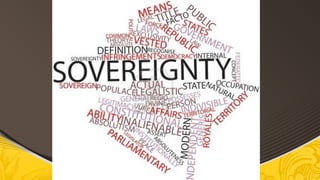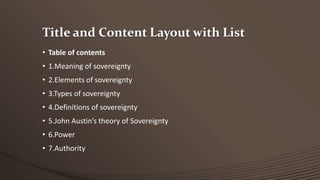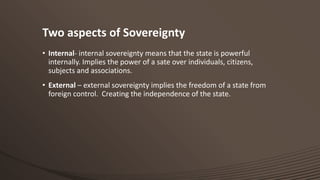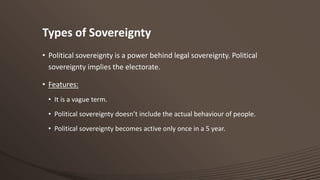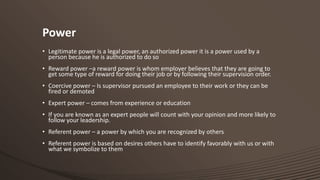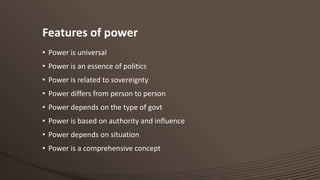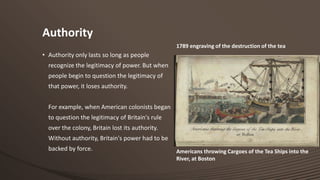Sovereignty
- 1. Sovereignty
- 3. Title and Content Layout with List • Table of contents • 1.Meaning of sovereignty • 2.Elements of sovereignty • 3.Types of sovereignty • 4.Definitions of sovereignty • 5.John Austin’s theory of Sovereignty • 6.Power • 7.Authority
- 4. Sovereignty • Sovereignty, though its meanings have varied across history, its core meaning is supreme power or authority within a territory. It is a modern notion of political authority. The state is the political institution in which sovereignty is embodied. • The word sovereignty is taken from Latin word ‘Supernus’ meaning supreme. The supreme power of the state is its sovereign power.
- 5. Sovereignty • The supreme, absolute, and uncontrollable power by which any independent state is governed; supreme political authority; the supreme will; paramount control of the constitution and frame of government and its administration; the self-sufficient source of political power, from which all specific political powers are derived; the international independence of a state, combined with the right and power of regulating its internal affairs without foreign dictation; also a political society, or state, which is sovereign and independent. • The power to do everything in a state without accountability, to other countries, to execute and to apply them, to impose and collect taxes and levy contributions, to make war or peace, to form treaties of alliance or of commerce with foreign nations.
- 6. SOVEREIGN STATE • One which governs itself independently free from any foreign power.
- 7. Two aspects of Sovereignty • Internal- internal sovereignty means that the state is powerful internally. Implies the power of a sate over individuals, citizens, subjects and associations. • External – external sovereignty implies the freedom of a state from foreign control. Creating the independence of the state.
- 8. Elements/ Characteristics • Sovereignty is a permanent concept of the state. So long as a state lasts, its sovereignty also lasts. Changes in government do not affect its continuity and permanence. A king or a sovereign or a dictator may die or be overthrown, sovereignty does not become extinct. • It is exclusive. It is the only power of the state. It means that there can be only one sovereign in a state. This feature is identical with indivisibility of sovereignty. • Sovereign powers can’t be divided equally. Sovereignty, it is said, is indivis-ible and cannot be divided into parts. According to Calhoun, "Sover-eignty is an entire thing; to divide it is to destroy it.
- 9. Elements/ Characteristics • It is inalienable. It can’t be transferred from one to another. This means that the state cannot transfer its sovereignty without its own death. Sovereignty being the vital element of the state, its alienability is tantamount to committing suicide on its part. • It is an original power • Sovereignty is defined as absolute, supreme and unlimited power. There is no other power higher than the state that can issue commands to it. The sovereign is the source of all laws and rights. It is above law. • It is all comprehensive. The sovereign has jurisdiction over all persons, things, associations and groups within the state territory. No person or association can claim exemption from its laws. Its laws are universal.It controls the external behavior of each person and association and thereby brings about social order.
- 10. Types of Sovereignty • Titular sovereignty: implies the power of a person theoretically and not practically. • Real sovereignty: implies the power of a person both theory and practice. • Legal sovereignty: the sovereign powers in the handle of law making body • The laws made by the legal sovereignty is final. • The laws are absolute • The violation of a law will result a punishment.
- 11. Types of Sovereignty • Political sovereignty is a power behind legal sovereignty. Political sovereignty implies the electorate. • Features: • It is a vague term. • Political sovereignty doesn’t include the actual behaviour of people. • Political sovereignty becomes active only once in a 5 year.
- 12. Types of Sovereignty • Popular sovereignty: means the supreme in the hands of the people. It is a system way the government functions on the basis of UAF. Popular sovereignty implies government based ballet. • De jure (by law), Sovereignty: derived from the Latin word by law. Who has occupied by sovereignty. Power and authority legally. • De facto (by faults) Sovereignty: It is sovereign by fact. He is an authority who has occupied the post by forced possession which is a fact (reason).
- 13. John Austin’s theory of sovereignty • Other names of the theory • Absolute theory of sovereignty • Monistic theory of sovereignty • Non-pluralistic theory • Single theory
- 14. John Austin’s theory of sovereignty • John Austin is an English jurist. He has given the definition of law and sovereignty. • Law: • Law is a command of a superior to an inferior • State and sovereignty is superior. People are inferior.
- 15. John Austin’s theory of sovereignty • Theory: “ If a determinate human superior not in the habit of like superior obedience but receives habitual obedience from the bulk of given society, then that society is political and independent and that sovereign is the determinate human superior.”
- 16. John Austin’s theory of sovereignty • Features of the theory: • Every state has a determinate human superior • The human superior will not obey the orders of like superior • The entire society will follow the orders of determinate human superior • His command is a law • Violation of his command will result in punishment • The society, which has a determinate human superior, is a political society, which is independent and free from external control
- 17. John Austin’s theory of sovereignty • Criticism: • His theory stands for absolute monarchy • Austin’s theory is against democratic principle • John Austin’s theory glorifies dictatorship • His theory violates the universal principle of law • Pluralist scholars criticize Austin theory • John Austin theory gives importance to only one source of law
- 18. John Austin’s theory of sovereignty • Sources of law, which are not there in Austin theory • Customs • Religion • Judicial decisions • Dharma • Legislation: law made by legislature • Commentary: commentary given by experts
- 19. Power
- 20. Power • Power is the capability of doing or accomplishing something essentially power is the bottom line of leadership. • Any person who influences you in some way shape or form has power. weather the CEO of the company or your best friends , if you do anything based on their suggestion they have power over you. Sometimes power is mutual as in friendship and sometime it is not , as in hierarchy • Power may be regarded as the ability to determine the behavior of others or to decide the outcome of the conflict where there is disagreement. It is likely to be resolved according to the relative resources of power of the available to the participants
- 21. Power • 2 types of power • Personalized power • Socialized power • Five sources of power • Legitimate power -Based on position or formal authority. • Reward power -The power to give pay, raises promotion, praise interesting projects another and rewards to subordinates. • Coercive power-The power to give or withhold punishment such as suspension, termination, or even the withholding of praise and goodwill. • Information Power : Power that comes from access to and control over information. • Referent power:Power that arises from one’s personality or physical or other abilities which induce others to believe in and follow that person. • Expert Power: Based on knowledge or information value.
- 22. Power • Legitimate power is a legal power, an authorized power it is a power used by a person because he is authorized to do so • Reward power –a reward power is whom employer believes that they are going to get some type of reward for doing their job or by following their supervision order. • Coercive power – Is supervisor pursued an employee to their work or they can be fired or demoted • Expert power – comes from experience or education • If you are known as an expert people will count with your opinion and more likely to follow your leadership. • Referent power – a power by which you are recognized by others • Referent power is based on desires others have to identify favorably with us or with what we symbolize to them
- 23. Features of power • Power is universal • Power is an essence of politics • Power is related to sovereignty • Power differs from person to person • Power depends on the type of govt • Power is based on authority and influence • Power depends on situation • Power is a comprehensive concept
- 24. Features of power • Power is universal • Power is an essence of politics • Power is related to sovereignty • Power differs from person to person • Power depends on the type of govt • Power is based on authority and influence • Power depends on situation • Power is a comprehensive concept
- 25. Authority
- 26. A Teacher's Authority Authority • The word authority is taken from the English word Authorised. • Authority refers to the use of power that is seen as legitimate or socially approved/recognized. • This concept of authority is delegated from one person or organisation to another. Teachers have authority because students recognize that their power over the classroom is legitimate.
- 27. Authority 1789 engraving of the destruction of the tea • Authority only lasts so long as people recognize the legitimacy of power. But when people begin to question the legitimacy of that power, it loses authority. For example, when American colonists began to question the legitimacy of Britain's rule over the colony, Britain lost its authority. Without authority, Britain's power had to be backed by force. Americans throwing Cargoes of the Tea Ships into the River, at Boston
- 28. Authority • Max Weber, in his sociological and philosophical work, identified and distinguished three types of legitimate authority. • Legitimate authority is that which is recognized as legitimate and justified by both the ruler and the ruled. Maximilian Karl Emil "Max" Weber a German sociologist, philosopher, and political economist whose ideas influenced social theory, social research, and the entire discipline of sociology.
- 29. Authority • RATIONAL-LEGAL AUTHORITY: It is that form of authority which depends for its legitimacy on formal rules and established laws of the state, which are usually written down and are often very complex. The power of the rational legal authority is mentioned in the constitution. Modern societies depend on legal-rational authority. Note: Government officials are the best example of this form of authority, which is prevalent all over the world.
- 30. Authority • TRADITIONAL AUTHORITY: • Traditional authority, derives from longestablished customs, habits and social structures. When power passes from one generation to another, then it is known as traditional authority. • Note: The right of hereditary monarchs to rule furnishes an obvious example. The Tudor dynasty in England and the ruling families of Mewar, in Rajasthan (India) are some examples of traditional authority.
- 31. Authority • CHARISMATIC AUTHORITY: • Here, the charisma of the individual or the leader plays an important role. Charismatic authority is that authority which is derived from "the gift of grace" or when the leader claims that his authority is derived from a "higher power" (e.g. God or natural law or rights) or "inspiration", that is superior to both the validity of traditional and rational-legal authority and followers accept this and are willing to follow this higher or inspired authority. Note: NT Rama Rao, a matinee idol, who went on to become one of the most powerful Chief Ministers of Andhra Pradesh.
- 32. Influence • Influence: It is the capacity to have an effect on the character, development or behaviour of someone. • A charismatic team member, or truly great boss, would be a person with influence. You can have influence whether you are granted authority or not. Influence can come from experience, ability, or charisma; it cannot be granted via promotion or election. • INFLUENCE AND AUTHORITY: Influence represents an ability to affect outcomes and depends on personality.
- 33. Diference between Authority and Influence Authority 1) Authority is the static structural aspect of power in organisation. 2) Authority is the formal aspect of power. 3) Authority refers to the formally synchronised right to make final decision. 4) Authority implies involuntary submission by subordinate. 5) Authorised flows downwards and it is unidirectional. 6) The source of authority is solely structural. 7) Authority is circumscribed that is the domain scope and legitimacy of the power are specific
- 34. Diference between Authority and Influence Influence 1) Influence is the dynamic tactical element. 2) Influence is informal aspect. 3) Influence is not sanctioned by the organisation and is therefore not a matter of organisational rights. 4) Influence implies voluntary submission and does not necessarily entail a superior subordinate relationship. 5) Influence is multi-directional and can flow upwards, downwards or horizontally. 6) The source of influence may be personal characteristic expertise or opportunity. 7) Influence is uncircumscribed that is, its domain scope and legitimacy.
- 35. Thank You


